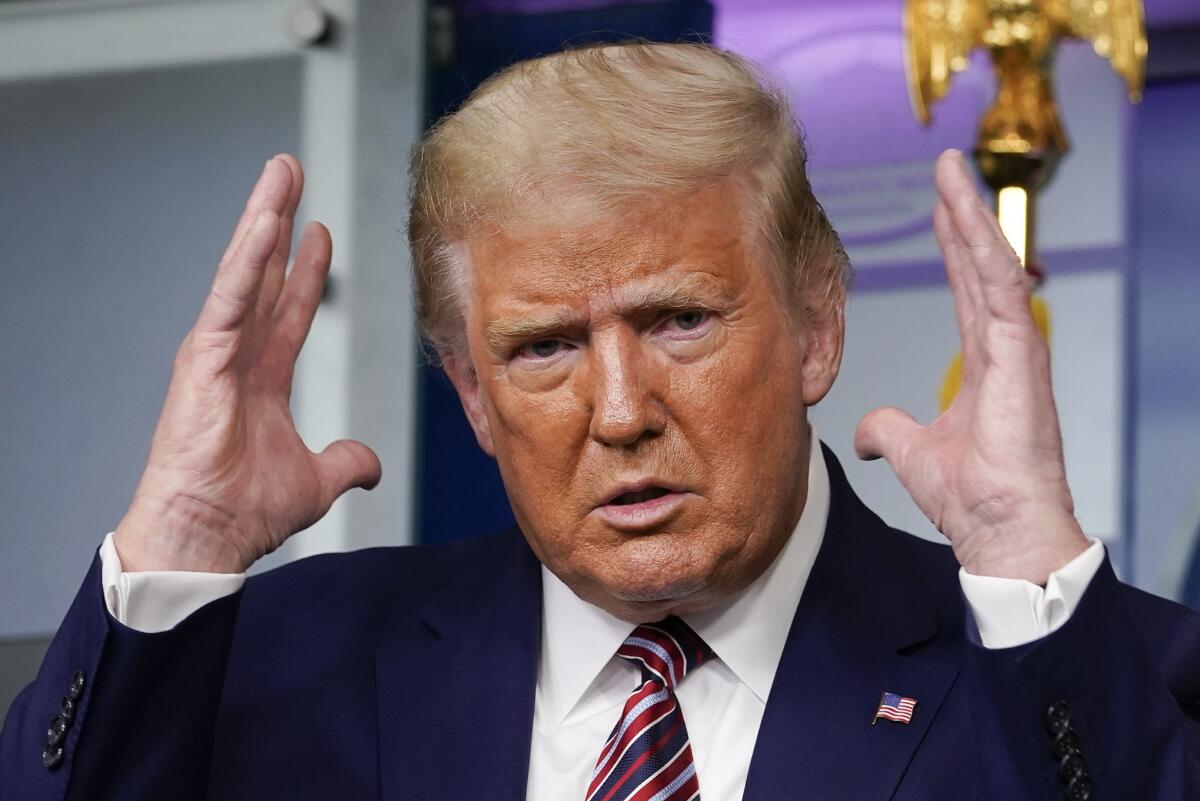Editorial: Here’s why Trump gets to exploit those tax loopholes — and you can’t

- Share via
Donald Trump rode into office on a wave of distrust and anger at Washington “elites” — the insiders who supposedly play the system for their own gain, to the detriment of the rest of us. The New York Times’ analysis of Trump’s recent tax returns, however, show that he played the system to a breathtaking degree. The tax code is an insider’s game. And the changes Trump pushed in the first year of his presidency made it even more so — and more lucrative for him.
According to the Times’ reporting (which we have to rely on because the president won’t release his returns), Trump found ways to collect enormous amounts of income and pay little or no tax on it. In more than half of the 18 years’ worth of returns the Times examined, Trump paid no taxes; in the last two, when Trump was running for president and then serving in the Oval Office, he paid $750 a year.
Here’s where billionaire investor Warren Buffett would point out that the president’s secretary was no doubt taxed at a far higher rate than Trump was. It’s grossly unfair.
As Buffett has observed, wealthy people earn most of their money from capital gains, which are taxed at a lower rate than wages. Trump enjoys not only that break, but also a series of advantages unique to real estate investors that cry out for reform.
For starters, he can legally claim that his hotels, office towers and golf courses are depreciating — losing value — and deduct that amount from his taxes even when their market value is increasing. (That’s on top of the deductions for maintenance and upkeep, plus interest payments on the money borrowed to buy the properties.) Meanwhile, the increase in his properties’ value isn’t taxed as long as the property is not sold. And even when it is sold, real estate investors can avoid taxes on their gains by purchasing more buildings and developments.
Worse, there are a slew of rules and exemptions that uniquely help real estate investors — loopholes that are particularly hard to defend for investors on Trump’s scale. The 2017 tax cuts that Trump sought and signed into law preserved those loopholes and added a few more, while also allowing unincorporated businesses such as Trump’s to cut their taxable revenue by 20%. Why? Because the bill slashed corporate tax rates (to make them more competitive internationally), and Congress didn’t want to leave “small business” out of the largesse.
The revelations about Trump’s tax returns will no doubt feed the debate over whether the wealthy, who collect a wildly disproportionate share of U.S. income, pay their fair share of taxes. (According to the National Taxpayers Union, the top 5% of U.S. earners gathered 37% of the income but paid 60% of the income taxes in 2017.) Trump’s example, though, highlights something else: how one particular special interest has bent the rules and opened the door to extreme tax avoidance.
And that’s a problem for all of us. As economist C. Eugene Steuerle of the Tax Policy Center in Washington put it, such policies “lower the growth rate of the economy both directly through the inefficient investment they spur and indirectly through the concentration of opportunity on too few people as a result of the inequality of wealth they create.” Trump’s tax returns have shined a spotlight on it; now it’s up to the rest of us to do something about it.
More to Read
A cure for the common opinion
Get thought-provoking perspectives with our weekly newsletter.
You may occasionally receive promotional content from the Los Angeles Times.










